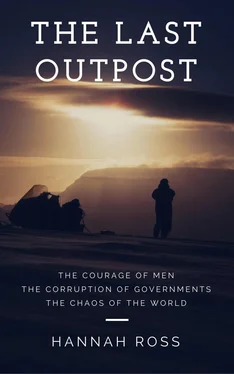All those he invited arrived at the meeting punctually to a minute, and as he entered the room, Scott suddenly realized they were looking to him for answers and reassurance. This realization was disconcerting, for he had never felt less fit to reassure anybody in his life.
There were only a few whom he knew more than in passing — Jerry and Zoe, Dr. Hope from the hospital, Sue Ellis of the research team, Fred the electricity technician. There was the head accountant, mechanics, scientists, and the head of maintenance. Though Victor Nash had not been invited — a little act of rudeness Scott relished in the midst of all the mayhem — he still found his way in, and was sulking somewhere in the back of the room. Come to think of it, the entire room was more crowded than Scott had anticipated. More people than he summoned must have come to hear what he had to say.
Scott walked over to an empty chair and turned it to face the crowd. He meant to sit but, realizing it would probably be more appropriate, remained standing. He cleared his throat. “I trust everybody knows why we have gathered here,” he said, sounding booming and authoritative and not at all like himself. “I have just received a briefing from my supervisor at the Antarctic Program, and I’m sure you have watched the news, which gives you a clue as to what is going on. In short, the world is one big mess right now, and here at McMurdo we’re just being hit by the side-currents of the disaster. Practically speaking,” he went on, “getting to and from the station is going to be a challenge in the upcoming months. Not all who were due to leave for the winter will be able to leave, and not all the supplies we might have counted on will be received.”
“And if we get into more details, Mr. Buckley?” Sue Ellis spoke up.
“A jet of one hundred and fifty passenger seats arrives the day after tomorrow. Fifty seats will be reserved for the remaining tourists, to evacuate them to New Zealand. This leaves a hundred seats for the summer workers. I cannot guarantee that another flight or ship will come after that, though I certainly hope for the best. It is beyond my power to make any promises, however.”
There was a great hubbub of voices at this declaration.
“A hundred and fifty seats, that’s fine and well,” said Stanley, the helicopter pilot, “but I’m sure the airplane can hold more if people agree to crowd in the passage and forget about the seat belts. They can undertake it at their own risk.”
“No, Stan,” Scott said. “This would be going against all safety regulations, and I’m sure that the New Zealand Airlines won’t permit it. For now, the situation at McMurdo does not justify such a measure. People would be safer staying here than flying to New Zealand without proper seats.”
“Maybe you should ask the people in question what they think about it,” suggested Sue. “As for us,” she swept the room with a glance, “I see that most of the people here are due to stay over winter anyway. But people who were counting on getting away before the dark season, they will panic at the idea of being divided from their families for another six months. They will be desperate to get home.”
“That is, if there’s a home to get to in two more days,” Jerry Gordon quipped, and people put their heads together and began whispering, some in panic, some in anger.
“Asking people will do no good,” Scott said. “We must count on a hundred seats for now, and we must make a priority list of who goes first. If we let people voice their opinion, I’m sure everyone will say their case is a top priority and they ought, beyond all discussion, to be on that flight to New Zealand.”
“So how do you suggest we determine the priority?”
“Well, there’s the age factor. I say all summer workers over sixty…”
“Don’t forget to provide wheelchairs for the greybeards,” the head of maintenance, who was at least seventy years old, put in acidly.
“And there are preexisting health conditions — Dr. Hope will be able to provide me with a record of those. We might run out of certain medicines over winter, and this will be a disaster for people with chronic conditions. There’s also the question of professional capability. Some summer workers would be an asset to us during the winter, with the population higher than we had counted on, while others would only be a burden. I plan to make a list of those professionals I would be glad to keep, and maybe they will volunteer to stay in the first place, reducing competition for the plane seats.”
“I will stay, if I’m any good,” said a voice with a thick accent. It was Petri Karhu, a marine biologist from Finland who came to McMurdo as part of an exchange program for researchers. A blonde giant with mighty fists, he reminded Scott more of the Anai hunters than of someone shut up in his laboratory eighteen hours a day whenever he wasn’t out taking water samples. “I understand it won’t be all about science this winter. If you need a pair of working hands…” he raised a massive forearm with a tattoo of a snake coiling around the wrist.
“Thank you, Mr. Karhu, this is much appreciated,” Scott said. “I intend to get to work on the list at once, and plan to have it ready by tonight. Either way, even at the most optimistic scenario, we are facing a winter of rather more people, and less supplies, than we had counted on. I sanguinely hope we will be able to avoid any real deficit of food, fuel or other necessities, but we will have to plan accordingly. We will have to make sure that the wind turbines are utilized to their full capacity — for that, of course, we will have to cooperate with Scott Base. There won’t be a shortage of purified drinking water, I trust, but we might have to limit shower times by installing timers.”
“I can shower three times a week,” Jerry said, amidst hearty sniggers. “It hasn’t hurt anybody yet.”
“That’s what you think,” someone elbowed him in the ribs.
“Jerry, you are one of the most important people at McMurdo right now,” Scott went on. “The greenhouse is no longer a luxury, it’s part of what may stand between us and food shortages this winter. I trust you to run it in as efficient a manner as possible, and focus on those vegetables that satisfy real nutritional needs rather than fancy tastes.”
“A few weeds won’t save us from going hungry, when the rubber hits the road,” Scott heard the odious voice of Victor Nash from the back. “If things get tough, we mustn’t forget that Antarctica has endless stores of food we can tap into when necessary. There are fish, seals, penguins…”
People were frowning, muttering, and shaking their heads. Scott gave Nash a scathing look.
“Mr. Nash,” he said, “may I remind you that McMurdo Station is committed to making, as much as possible, zero impact on the environment? All wildlife in Antarctica, whether on land or in the waters, is protected according to the law.”
“There would be exceptions when people are starving, I’m sure,” Nash said, giving him an insolent look and eliciting some disapproving stares from the research teams.
“We’re nowhere near that point just yet, thank you very much. When the stores are depleted, then you can talk to me about a possibility of exploiting wildlife for food, but not before. Right now I don’t want to hear another word about that.”
Nash fell silent, glaring and chewing his lower lip.
“There’s also the question of communications,” Zoe put in. “These are often patchy throughout the winter, and I expect this time they will be even more so. People will have to have patience. We’ll have to limit internet calls and heavy file transfer, and maybe even usage of email altogether if enforcing other rules doesn’t work.”
Читать дальше












